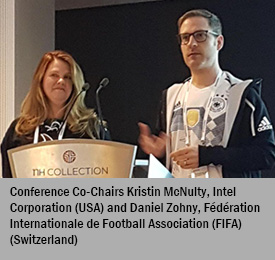Beyond the Playing Field: INTA’s 2020 Europe Conference Sheds Light on the Convergence of Sports and Esports
Published: March 1, 2020
Aleksandra Rostkowska Darts-IP Brussels, Belgium
 Bienvenida a Madrid
Bienvenida a Madrid
While watching and participating in sporting activities is a global pastime, Spain is one of the nations that stands out in terms of enthusiasm for sports. The country hosted the 1982 FIFA World Cup and the 1992 Summer Olympics, and it boasts top athletes, including tennis superstar Rafael Nadal, and the renowned football teams Real Madrid and FC Barcelona. In short, Spaniards are extremely passionate about sports!
With this in mind, Madrid made a fitting venue for the 2020 Europe Conference-Brands, Sports, and Esports: A Brand (R)evolution. On February 17 and 18, more than 250 brand professionals from more than 40 countries descended on the Spanish capital for two days of engaging presentations, and to discuss the hottest topics in sports and esports industries as they relate to brands and intellectual property (IP).
Setting the Stage
During his welcome address, INTA CEO Etienne Sanz de Acedo noted how few brands have a stronger connection with their fans than sport brands, sharing, as an example, the passion he has for his home football team, Spain’s Real Sociedad. He also observed that we are entering a new and exciting chapter in which we will see the face of the sports landscape change forever. Conference Co-Chairs Kristin McNulty (Intel Corporation, USA) and Daniel Zohny (Fédération Internationale de Football Association (FIFA), Switzerland) set the stage for speakers-both brand professionals and athletes-representing some of the biggest brands from both worlds: traditional sports and esports. Exemplifying the point made by Mr. Sanz de Acedo about sports fans, the co-chairs noted how Portuguese professional footballer Cristiano Ronaldo became the first person to reach 200 million followers on Instagram!
 Sports and Esports Industries Highlight Universal IP Issues
Sports and Esports Industries Highlight Universal IP Issues
Given the broad nature of the concerns for brands in sports and esports, brand professionals need to be well-rounded to be able to face this unique set of challenges and rapidly changing field. As INTA President Ayala Deutsch (NBA Properties, Inc., USA) noted in her day two opening remarks, the Conference program, “speaks to the myriad and ever-evolving issues facing brands and brand professionals today. … At the same time, I think it can be said that all of us, no matter what industry we work in, stand to benefit from the lessons learned and skills acquired at this Conference.”
The Rise of Esports
For many, esports is a relatively new phenomenon. However, it has indeed grown tremendously in recent years. A summit held by the International Olympic Committee in October 2017 acknowledged the growing popularity of esports, concluding that, “Competitive ‘esports’ could be considered as a sporting activity, and the players involved prepare and train with an intensity which may be comparable to athletes in traditional sports,” but would require any games used for the Olympics to fit “with the rules and regulations of the Olympic movement.” (E-sports just got closer to being part of the Olympics,” Business Insider, Oct. 28, 2017)
Keynote Speaker Andy Stalman (TOTEM Branding, Spain) eloquently drove home the growing importance of esports worldwide. In presenting a list of the most popular individual sports in 2019 and the value of prizes awarded in these sports, he noted that the Fortnite World Cup (an online video game) took second position after the U.S. Open Tennis Championships, with a prize of US $3 million. (In 2019, the winners of the men’s and women’s singles at the U.S. Open received US $3.85 million.)
Mr. Stalman also emphasized the mounting need to address the legal and operational issues around planning and executing an esport event. “Brands need to embrace the online and offline worlds at the same time, not separately,” he said.
Building (and Financing) a Successful Sports Brand
Presentations by renowned representatives of the sports world offered practical insights. Former Olympic Windsurfer Alessandra Sensini (Italian Olympic Committee, Italy) shared her thoughts on building a brand from the perspective of the athlete and the sports business. She also reminded the audience that Olympic athletes are bound by the strict rules of the Olympic Charter: they cannot allow their name, picture, or sports performances to be used for advertising purposes during the Olympic Games.
In a subsequent session focused on best practice tips for effective sponsorship collaborations, complex legal questions covering issues such as ambush marketing prevention and mitigation, “business back” transactions in sponsorship alliances, and sponsor entitlements and associated rights were tackled by Anna Guix (FC Barcelona, Spain), Christian DurÁn (DurÁn-Corretjer, SLP, Spain), Alex Junco (Nike, Inc., Spain), and David Trassle (FIFA, Switzerland). The panelists discussed the most common contractual aspects related to building brand awareness, as well as reputational issues, exclusivity of the product, and the creation, registration, and ownership of shared logos.
Technology Takes Center Stage
David Reichelt (Color Switch, USA) shared insight into the creation of Color Switch, the fastest game in Apple App Store history to reach 50 million downloads in more than 150 countries, as well as the IP struggles he encountered along the way.
Technology was another major theme covered over the two days. The rising importance of streaming platforms, social media, and influencers, for example, is dramatically transforming fan engagement, and brands are changing their approach to engaging with viewers during events.
“Traditional sport needs to adjust to the new reality, where technology plays a major role,” stressed Ignacio Trujillo (OWQLO Tech Smart Sports Connector, Spain). “Multichannel approach should be the response to the desires of the so-called generation ‘Netflix’ as it gives the opportunity to create your own perspective with whom, where, and when we want to participate in any event or activity, including sports and esports.”
 Echoing this sentiment, Tuan Le (Intel Corporation, USA) noted, “Technology helps us to be right there, enables the experience to be more personalized, data-rich, and social.”
Echoing this sentiment, Tuan Le (Intel Corporation, USA) noted, “Technology helps us to be right there, enables the experience to be more personalized, data-rich, and social.”
Diversity and Inclusion in Sports
One of the pressing issues discussed was the presence of women in sports. Ms. Deutsch reminded participants of the importance of diversity and inclusion not only in the sports and esports industries, but as “something that we must be mindful of in the IP industry.” She touched on some of INTA’s initiatives to foster and celebrate diversity. She also shared insight into the NBA’s commitment to create and sustain a culture of inclusion at every level of the organization, noting, “We believe that diversity and inclusion are essential to the success of our game.”
In an energizing and motivating speech, Rebecca Smith, Global Director of the Women’s Game at COPA90 (United Kingdom), shared her personal story as a former World Cup and Olympic footballer, and emphasized the urgency to increase the visibility and reach of women’s football while making a positive impact on society.
Although every effort has been made to verify the accuracy of items in the INTA Bulletin, readers are urged to check independently on matters of specific concern or interest.
© 2020 International Trademark Association
This website uses cookies so that we can provide you with the best user experience possible. Cookie information is stored in your browser and performs functions such as recognising you when you return to our website and helping our team to understand which sections of the website you find most interesting and useful.
To find out more please see our Cookies Policy and Privacy Policy.
These cookies are used to identify a user’s browser as the visitor goes from page to page on the Site. These are session cookies, which means that the cookie is deleted when you leave the Site. It is an integral piece of the Site software and used to let the server know which users are on the Site at any given time and make certain parts of the Site easier to use.
|
|
If you disable this cookie, we will not be able to save your preferences. This means that every time you visit this website you will need to enable or disable cookies again.
These cookies are used to collect information about how visitors use our Site. The cookies collect information in anonymous form, including the numbers of visitors to the Site, where visitors have come to the Site from, the pages they visited and how they have interacted with tools on the Site like search and embedded media players. We use the information to compile statistical reports of our users’ browsing patterns so that we can improve the Site.
|
|
Please enable Functionality Cookies first so that we can save your preferences!
These cookies are used to deliver advertising relevant to the interests of visitors to our Site. They are persistent, which means they will remain on your device after you leave the Site.
- Facebook (Ad Pixel)
- Google (Ad Pixel)
- LinkedIn (Ad Pixel)
- Quattro Anonymous
Please enable Functionality Cookies first so that we can save your preferences!
